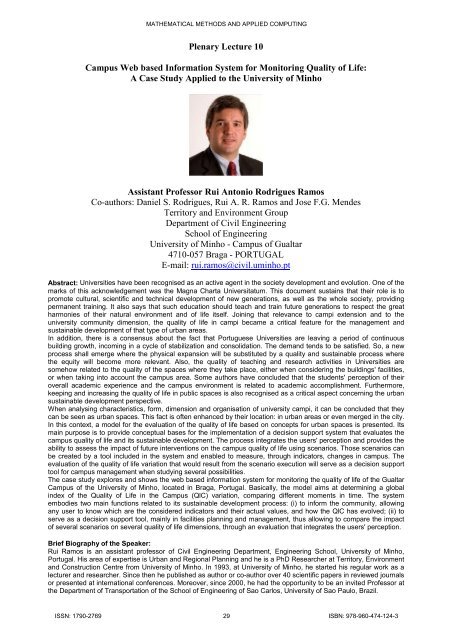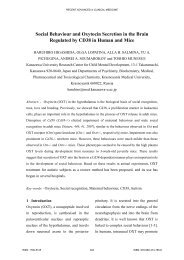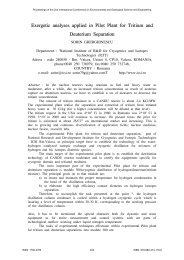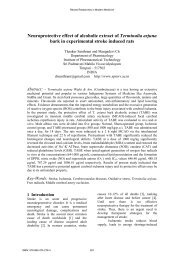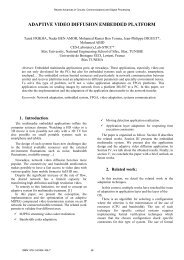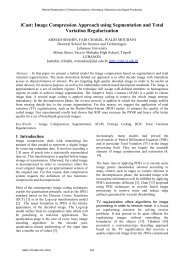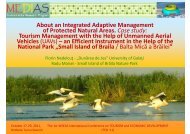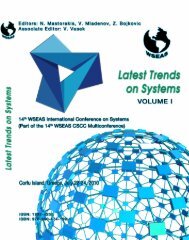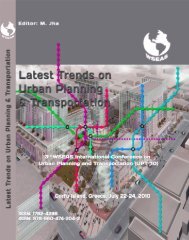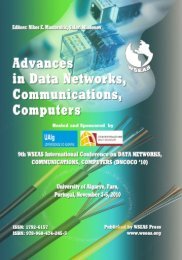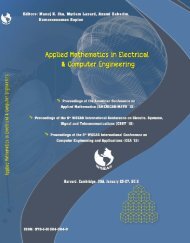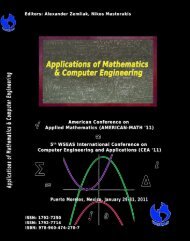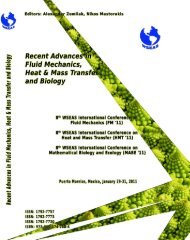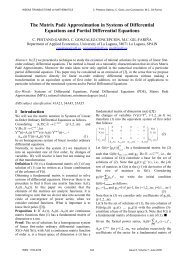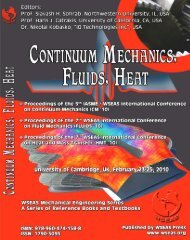Mathematical methods and - Wseas.us
Mathematical methods and - Wseas.us
Mathematical methods and - Wseas.us
Create successful ePaper yourself
Turn your PDF publications into a flip-book with our unique Google optimized e-Paper software.
MATHEMATICAL METHODS AND APPLIED COMPUTINGPlenary Lecture 10Camp<strong>us</strong> Web based Information System for Monitoring Quality of Life:A Case Study Applied to the University of MinhoAssistant Professor Rui Antonio Rodrigues RamosCo-authors: Daniel S. Rodrigues, Rui A. R. Ramos <strong>and</strong> Jose F.G. MendesTerritory <strong>and</strong> Environment GroupDepartment of Civil EngineeringSchool of EngineeringUniversity of Minho - Camp<strong>us</strong> of Gualtar4710-057 Braga - PORTUGALE-mail: rui.ramos@civil.uminho.ptAbstract: Universities have been recognised as an active agent in the society development <strong>and</strong> evolution. One of themarks of this acknowledgement was the Magna Charta Universitatum. This document s<strong>us</strong>tains that their role is topromote cultural, scientific <strong>and</strong> technical development of new generations, as well as the whole society, providingpermanent training. It also says that such education should teach <strong>and</strong> train future generations to respect the greatharmonies of their natural environment <strong>and</strong> of life itself. Joining that relevance to campi extension <strong>and</strong> to theuniversity community dimension, the quality of life in campi became a critical feature for the management <strong>and</strong>s<strong>us</strong>tainable development of that type of urban areas.In addition, there is a consens<strong>us</strong> about the fact that Portuguese Universities are leaving a period of continuo<strong>us</strong>building growth, incoming in a cycle of stabilization <strong>and</strong> consolidation. The dem<strong>and</strong> tends to be satisfied. So, a newprocess shall emerge where the physical expansion will be substituted by a quality <strong>and</strong> s<strong>us</strong>tainable process wherethe equity will become more relevant. Also, the quality of teaching <strong>and</strong> research activities in Universities aresomehow related to the quality of the spaces where they take place, either when considering the buildings' facilities,or when taking into account the camp<strong>us</strong> area. Some authors have concluded that the students' perception of theiroverall academic experience <strong>and</strong> the camp<strong>us</strong> environment is related to academic accomplishment. Furthermore,keeping <strong>and</strong> increasing the quality of life in public spaces is also recognised as a critical aspect concerning the urbans<strong>us</strong>tainable development perspective.When analysing characteristics, form, dimension <strong>and</strong> organisation of university campi, it can be concluded that theycan be seen as urban spaces. This fact is often enhanced by their location: in urban areas or even merged in the city.In this context, a model for the evaluation of the quality of life based on concepts for urban spaces is presented. Itsmain purpose is to provide conceptual bases for the implementation of a decision support system that evaluates thecamp<strong>us</strong> quality of life <strong>and</strong> its s<strong>us</strong>tainable development. The process integrates the <strong>us</strong>ers' perception <strong>and</strong> provides theability to assess the impact of future interventions on the camp<strong>us</strong> quality of life <strong>us</strong>ing scenarios. Those scenarios canbe created by a tool included in the system <strong>and</strong> enabled to measure, through indicators, changes in camp<strong>us</strong>. Theevaluation of the quality of life variation that would result from the scenario execution will serve as a decision supporttool for camp<strong>us</strong> management when studying several possibilities.The case study explores <strong>and</strong> shows the web based information system for monitoring the quality of life of the GualtarCamp<strong>us</strong> of the University of Minho, located in Braga, Portugal. Basically, the model aims at determining a globalindex of the Quality of Life in the Camp<strong>us</strong> (QlC) variation, comparing different moments in time. The systemembodies two main functions related to its s<strong>us</strong>tainable development process: (i) to inform the community, allowingany <strong>us</strong>er to know which are the considered indicators <strong>and</strong> their actual values, <strong>and</strong> how the QlC has evolved; (ii) toserve as a decision support tool, mainly in facilities planning <strong>and</strong> management, th<strong>us</strong> allowing to compare the impactof several scenarios on several quality of life dimensions, through an evaluation that integrates the <strong>us</strong>ers' perception.Brief Biography of the Speaker:Rui Ramos is an assistant professor of Civil Engineering Department, Engineering School, University of Minho,Portugal. His area of expertise is Urban <strong>and</strong> Regional Planning <strong>and</strong> he is a PhD Researcher at Territory, Environment<strong>and</strong> Construction Centre from University of Minho. In 1993, at University of Minho, he started his regular work as alecturer <strong>and</strong> researcher. Since then he published as author or co-author over 40 scientific papers in reviewed journalsor presented at international conferences. Moreover, since 2000, he had the opportunity to be an invited Professor atthe Department of Transportation of the School of Engineering of Sao Carlos, University of Sao Paulo, Brazil.ISSN: 1790-2769 29 ISBN: 978-960-474-124-3


